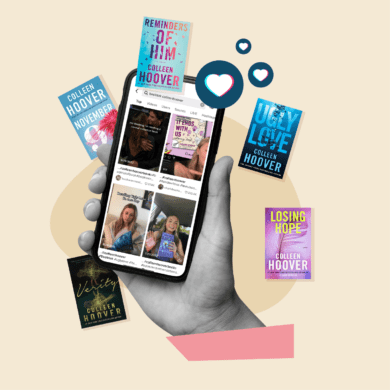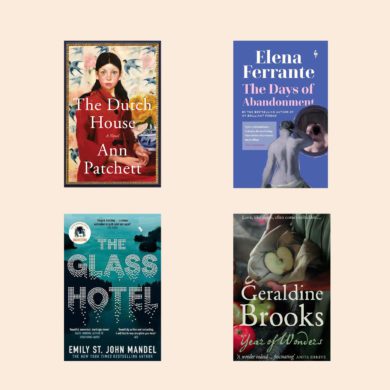One Monday night recently, during the usual dinner-shower-bedtime debacle that occurs in every household with young children across Australia between the hours of 6 and 7pm, my 10 year old was more frazzled than normal. She was In A Tizz, as my grandmother might have put it.
“It’s my Garmin,” she said. “I didn’t wear it today, and I was up to a 25-day streak, and now I won’t get it because I didn’t meet my step count.”
Reader: I could have cared less. But it was important to her, and so we ensured that in the middle of teeth-brushing and pyjama-putting-on she completed her (admittedly, very low) goal of 1000 steps (not a typo; that number is not missing a zero). Her streak continued. The bedtime ritual went on.
Using apps to track and change our habits is not new, or rocket science (see above, re: 10 year old). And sure, while I raised an eyebrow at my daughter’s insistence she complete her streak, there was a part of me that got it. She had done the work. She wanted to be rewarded, even if she knew (I hope she knows) that the shallow validation of a gadget strapped to her wrist is ultimately meaningless. The only value placed on this is one she has assigned herself – but that, of course, is the point.
What my daughter felt – that complex alchemy of striving and validation – is the exact feeling that a raft of new apps is hoping to replicate. From Noom to Reframe, these apps incorporate psychological tactics to change behaviour. Pick something you want to change about yourself – drinking less, exercising more, meditating, cutting down on social media use – and there is an app for it.
That alchemy of striving and validation is the exact feeling that a raft of new apps is hoping to replicate.
But, as anyone who has considered shelling out hundreds of dollars for one of these apps wants to know, do they actually work? And why are they suddenly so popular?
If you’ve spent any time on social media over the new year period, I will wager you’ve seen an ad for Noom, a calorie-counting app that claims it is “different” and “not a diet.” Instead of creating meal plans or prescriptive routines, Noom is about changing habits – adding salad to your plate, walking more – that sort of thing.
There is evidence that its gently-gently, knowledge-building approach works – in a 2015 survey study, the University of Sydney ranked it number one of 800 weight loss apps. But I’d like to see for myself.
I download the app and answer a long series of questions about my medical history, current stress levels, goals and more. I’m asked to enter a target weight, and I choose a low number just to see what happens, the app immediately tells me this is not advisable: at this weight, my BMI would be too low to be healthy. So far, so good. I amend the goal weight to a healthier number, and we crack on.
The app then offer mini-lessons in weight loss and quizzes me on my knowledge of healthy eating behaviours – but it’s all pretty obvious stuff. Anyone who has read a women’s magazine knows that grapes are less calorically dense than sultanas, making them the “better” snack. I ace the test. Based on my scores, the app tells me I can lose five kilos in just over six weeks. Then it prompts me for my credit card details.
The app tells me I can lose five kilos in just over six weeks. Then it prompts me for my credit card details.
With this approach, Noom made US$400 million in revenue in 2020 alone, presumably with a healthy bump from those of us who had pandemic-related weight to shed. The next year, the business was eyeing a potential initial public offering at a market valuation of US$10 billion. But when companies fly high, they also tend to skid low. The backlash to Noom was a slow burn – body positivity advocate Virginia Sole-Smith wrote about Noom and the millennification of diet culture in The New York Times, followed by a trickle, and then a flood, of other negative press.
Dr Barbara Mullan doesn’t discount behaviour change apps like Noom, Happify (which aims to lower stress), Streaks (which encourages users to set small daily goals) and Reframe (which focuses on reducing alcohol consumption).
In fact, the professor of health psychology at Curtin University thinks that in many circumstances, apps can be helpful in rerouting our behaviours.
“For certain people, these are a great way to kickstart a new behaviour. And they do tend to have a more sustainable approach.”
Noom, for example, aims to use data to show that even calorie-dense foods can be part of a healthy diet, as long as you factor them into your overall calorie intake. This is the opposite of old-school diets, where certain foods – and even entire food groups – are off limits.
Noom is the opposite of old-school diets, where certain foods – and even entire food groups – are off limits.
Unlike traditional dieting programmes, with their weigh-ins and rulebooks, Noom takes a warm, friendly approach. Its familial tone feels super-millennial (I’m frequently told that I’ve “got this” and I’m “aceing the day”), if a little parental (does it really need to remind me that it’s a good idea to snack on fruit?).
Noom and its ilk also rely on gamification – or what Dr Mullan calls the “gold star effect” – tick off a task, get a reward. Eat a cucumber (15 calories), receive a stamp of approval. “The simple truth is that humans like validation,” she says.
The problem is when this is the only validation, she notes. “Getting a gold star from an app should not be our only motivation,” she says. Extrinsic motivators – anything outside ourselves – will only take us so far. “What really helps is understanding your own behaviour. What is the cue that prompts your action?”
Fitness coach Lucy Baker believes that the community effect of behaviour change apps also help some users. “It’s not just you on the app,” she says. “It’s potentially millions of people, all up against the same challenge, or working towards similar goals. So that can help with motivation.”
But building habits requires more than a sheen of “neuroscience.” While apps like Noom and Reframe are flush with information from academics, knowledge alone can’t make you extract your spoon from a bowl of tiramisu or put down that glass of wine. This is why Noom offers online access to psychologists and both it and Reframe ask a series of questions about habits – when do you feel like you want to overeat? When do you feel most stressed?
This, says Dr Mullan, is key.
“Even though our research suggests that there is a big difference between forming healthy habits and stopping bad habits, the common denominator is the trigger,” she says.
Forming habits is about planning – in other words, avoiding triggers. Wanting to eat a better diet is a new habit that requires forethought – grocery shopping, for example. Stopping a habit is about knowing the cue that drives you to it. If that’s two or three glasses of sav blanc on a Tuesday, maybe it’s that you associate drinking with a certain friend you see, or venue you frequent. Changing those things, or replacing drinking with a walk or fitness class, can help shift that habit, says Dr Mullan. You can use an app to help, but eventually, you’ll have to do the heavy lifting yourself.
Forming habits is about planning – in other words, avoiding triggers.
And that reminds me of something behavioural scientist Nir Eyal has noted, too: habit apps work if you are in the habit of them. All the cues and rewards matter very little if you’re not someone already in the habit of tracking your daily habits. Because tracking them via an app is not going to be second nature – it will take time and effort. In other words, you will have to make tracking a habit in itself.
One way the new apps try to build habits is by sending text messages and alerts.
Happify, which aims to decrease stress through mindfulness activities, sends regular “pick-me-up” affirmations; Noom pings me encouraging messages all too often (I get it, leafy vegetables are packed with nutrients).
But, for me, just having a reminder is not enough. I need to build the habit, and do it for my own reasons. I call nutritionist Sarah di Lorenzo, who works with clients looking to improve their relationship with food. For her, this is all about building better habits that are sustainable in the long-term.
“For someone who is driven by data, it can be very appealing to see tasks ticked off or numbers on a graph,” she says. “And that can make people accountable.”
Like, for instance, my daughter, who craves the validation of her Garmin streak.
Di Lorenzo also says that calorie counting, on an app like Noom, can sometimes have a healthy effect in that it shows people (most often women, she adds) how much they are able to eat. “I have women tell me they haven’t eaten carbs in a decade. And I can say, ‘Well, a slice of sourdough is 100 calories. So why can’t you have that?’ Showing people the numbers can give them freedom.”
It can also lead to obsession, though, and that’s the root of the body positivity backlash to Noom and its ilk. Baker calls these apps “extremely dangerous”.
“The approach here is one-size-fits-all, and any app that provides calorie or macro targets without more information on the individual is risky,” she says. It’s not merely a question of potentially developing disordered eating habits, but for maintaining health more generally.
Which brings us back to the question of habits – as with most things in life, there are a great many factors that can help them stick. Downloading Streaks did not help me eat more protein. Noom was too patronising in its tone for me to warm to it. Happify was too, well, happy, with me.
The only thing I have found that makes me create a habit is the knowledge that it makes me feel good. When I stopped drinking, I was able to stick to it because I knew how it would feel to start again (lethargic, sloppy, dehydrated). When I started lifting weights, I kept going because I knew I would finish each session feeling alive, energised, like an athlete. When I instructed myself to put my phone away on public transport and dig out the book I had diligently, optimistically packed, I knew I would arrive at work feeling accomplished, not drained from the social media vortex I’d allowed myself to be vacuumed into. The habits were their own reward. It was as simple – and hard – as that.













No Comments